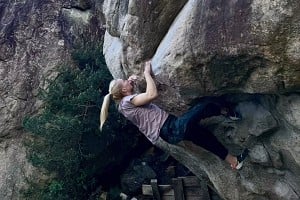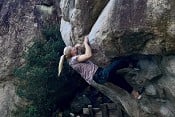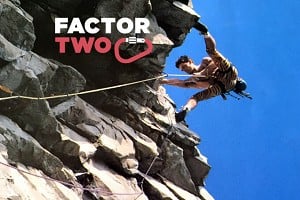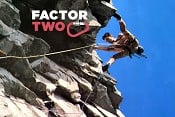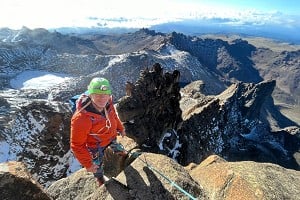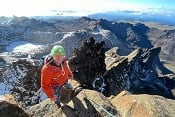
A friend asked me when, where and how did the term sport climbing come into being?
I don't know and can't find out.
I think when Gary Gibson did the FA of Clarion Call in 1983 it's widely accepted as the UK's first fully bolted free climb, but people were still yo-yoing back then. Redpointing came from Germany, but I am not sure about the term sport climbing.
It was invented so that John Sherman could proclaim that 'sport climbing is neither'.
> It was invented so that John Sherman could proclaim that 'sport climbing is neither'.
...which curiously encapsulates two falsehoods into just a four-word sentence!
Verm was always short with words
Possibly either....
Alan Watts in the early 80's at Smith Rocks.
Tom Frost in an article.
John Long in an article.
"Sport climbing" as an actual movement began at a comp at Snowbird with Tribout and Edlinger, about 1986?
...at least that is what a quick search tells me. Probably grew out of all of these as well as other things. Sounds like it was definitely in the 80's though.
Actually he was rather talkative chap when I met him and his wife in 'Bleau.
Dead giveaway were his trademark double Metolius chalkbags on either side.
> Dead giveaway were his trademark double Metolius chalkbags on either side.
Four chalk bags is definitely overdoing it....
sorry... missed the comma.... double bags, one on either side.
Clearly visible on some of his iconic pictures btw.
Wow, twice as much aid as anyone else !!
Does hand placed bolts on a free climb count as 'sport'?
Climbs in that style certainly started appearing in the UK in the mid 80s. I can recall failing to get more than a couple of moves up Just Another Dead End Job in about 1985. But I don't recall it being described as sport climbing at the time. I didn't hear that term until 1989, on a visit to Croatia, when being given directions by a German climber.
Sport climbing for punters didn't really kick off in the UK until Pete Oxley and others started bolting at Portland.
What's the french equivalent of the phrase sport climbing (climbing ) and when did that appear?
Exactly. There was definitely a feeling at the time, in some quarters at least, that it was all an unpleasant foreign innovation. I wouldn't be surprised if the term is of German origin, just like redpoint.
I remember the expression being widely met in climbing circles, at the time (late 80's), by derision along the lines of Verm's comment. And yet the moniker was appropriately inappropriate! Around the same time we got lycra, expressions like "dude" and "rad", and electronic disco music. They all seemed to belong together.
Kurt Albert , rotkreutz and rotpunkt , late 70s and early 80s.
Jean Pierre Bouvier, Chimpanzodrome
patrick Bérhault, la Haine
> I think when Gary Gibson did the FA of Clarion Call in 1983 it's widely accepted as the UK's first fully bolted free climb,
Wasn't Statement Of Youth considered the birth of "true" sport climbing in Britain? i.e. a route that didn't previously exist that was fully bolted up specifically to be climbed in the then conteinental style.
Before that people free climbed old aid routes with some bolts on them and maybed added the odd bolt or two to a route but didn't wholesale bolt a full line.
Other than yourself these responses don't really answer the question which was about the term sport climbing. John's friend also asked me and I suggested it was a direct translation from Sportklettern as you propose. Gullich and Kubin's Sportklettern Haute was published in 1986 so it presumably had been in use for a year or two before then. The Verm slogan was available as a bumper sticker sported by some US climbers in the early 90s. My guess is early 80s German, literally translated into English in the mid-to-late 80s.
As Germans invented sport climbing (more than climbing with bolt protection) it's appropriate if they also donated the nomenclature.
I got rid of all my climbing mags, but I remember an article in the early ‘80s written by Basher Atkinson, titled ‘a different sport’ in High Magazine. It featured Martin, Andy P and others’ exploits on Peak limestone. Those routes weren’t what you would call ‘clip ups’ but the case was made and I think ‘sport climbing’ was used.
The F grade wasn’t used. Indecent Exposure (with tree) (7b+) was E6 6b then, I think. What we called ‘dogging it and practicing, then leading it clean’ became the far more elegant Redpointing. It’s funny how some memories stay with you. From what I remember, you had to get the tree swaying a fair bit to clip the first bolt, or maybe I wasn’t swaying it enough.😂
That makes a lot of sense, Duncan- at least more than any other explanation I've heard.
> The F grade wasn’t used. Indecent Exposure (with tree) (7b+) was E6 6b then, I think.
'E flipping 6!' as Gill memorably wrote. Big grade breakthrough for the ladies. (Though if Geraldine had even vaguely considered falling off, female grades would have shot through the roof. She still did amazingly well - best female climber in the UK for circa 15 years??)
> What we called ‘dogging it and practicing, then leading it clean’ became the far more elegant Redpointing.
When dogging became redpointing, our world changed. Climbing standards went ballistic. Part of me yearns back to the days of hero or zero. Either you did or you didn't - first time out the gate. But hey, that's just nostalgia. "Take!" (Err... I think I'm 'working' this.)
> It’s funny how some memories stay with you. From what I remember, you had to get the tree swaying a fair bit to clip the first bolt, or maybe I wasn’t swaying it enough.😂
Ah Paul, the hallowed tree of memories! Reminds me of Cool Hand Luke. "Keep shakin' that bush, Luke!" "Ah'm shakin' it, boss, ah'm shakin' it!" < "Fu*ck off!" >
Once I'd left the top branch of that scabby, shagged out tree, I was only too well aware the clock was ticking. Went back a few weeks later and Dalvinder was wandering all over the place. Route finding, I think they call it. "Where does it go?" she wailed. "Follow the bolts!" After a seeming eternity, she finally popped off, a spit below the sanctuary of the break. Probably with more stamina left in her than I'd had when I left the scabby, shagged out tree.
How much fun can you have on a toilet of a crag?
Mick
> Though if Geraldine had even vaguely considered falling off, female grades would have shot through the roof. She still did amazingly well - best female climber in the UK for circa 15 years?
She certainly was up there, but I think Fliss Butler, Ruth Jenkins and Sylvia Fitzpatrick might each have a stronger claim once the 90s had settled in.
> I got rid of all my climbing mags, but I remember an article in the early ‘80s written by Basher Atkinson, titled ‘a different sport’ in High Magazine. It featured Martin, Andy P and others’ exploits on Peak limestone. Those routes weren’t what you would call ‘clip ups’ but the case was made and I think ‘sport climbing’ was used.
If anyone's trying to find this it's actually on pages 36-43 of Mountain #100, Nov/Dec 1984 edition. I haven't been able to spot the word 'sport' - other than in the title. A Mammut advert on page 3 of the same edition refers to Carrigan as "....this universal, sports, and free climber...." - whatever that means, precisely!
Hi Mick, your reference to ‘the clock ticking’ is spot on. It’s such a long time ago, I don’t think the climbing was steep, just thin, marginal. I think the grade was insisting that I was taking the p**s just being there. 😂
I think Gill had led Behemoth on Central Buttress not long before Indecent, so her trajectory was no surprise.
I spent countless hours/days belaying a limpet like Geraldine, stationary under overhangs. She was a brilliant climber. But with a hangover on a cold Sunday morning it could be hard work holding the ropes.
> The F grade wasn’t used. Indecent Exposure (with tree) (7b+) was E6 6b then, I think.
I may be wrong, but I've a feeling the E6 bit was for the 2nd pitch?
> I may be wrong, but I've a feeling the E6 bit was for the 2nd pitch?
Hi Jon, Admittedly after nearly 40 years my memory is a bit sketchy. I had a big guidebook clear out and the only guides I have left are either current sports grades, or one where pretty well everything on the Tor is an aid route except for Cream Team Special and a couple of others.
> If Mammut advert on page 3 of the same edition refers to Carrigan as "....this universal, sports, and free climber...." - whatever that means, precisely!
Maybe sucking up to to potential Australian customers by using "sports" instead of "mates"?
PS or maybe because Kim was often in the Peaks?
Ah, I'm wrong. Just found the 92 Peak Rockfax where it says E6 6b / 7b+ - the second pitch is only E4 and it's this pitch that gives the climb its name - I knew the second pitch had some relevance! Interestingly, even in 92 both E and French grades were still being used.
Like you, I strongly suspect that sport climbing is a calque of “Sportklettern”. Funny enough german sources usually claims that “Sportklettern” originates in the USA in the late 60s or early 70s from Saxony and British roots.
Oskar Bühler started to manufacture his stainless steel glue-in bühlerhaken to replaced fixed pitons in the Frankenjura in the mid 60s.
1987 BMC Peak Limestone Chee Dale guide - Indecent Exposure 55m E6 6b,6a
Other routes' grades can be supplied on request 😁
> Ah, I'm wrong. Just found the 92 Peak Rockfax where it says E6 6b / 7b+ - the second pitch is only E4 and it's this pitch that gives the climb its name - I knew the second pitch had some relevance! Interestingly, even in 92 both E and French grades were still being used.
Thank goodness for that, I thought the first pitch was challenging. I’ve only ever been able to do trad 6b moves if a. I get lucky, b. I practice it. It was b. on that route.
> Other than yourself these responses don't really answer the question which was about the term sport climbing. John's friend also asked me and I suggested it was a direct translation from Sportklettern as you propose. Gullich and Kubin's Sportklettern Haute was published in 1986 so it presumably had been in use for a year or two before then. The Verm slogan was available as a bumper sticker sported by some US climbers in the early 90s. My guess is early 80s German, literally translated into English in the mid-to-late 80s.
> As Germans invented sport climbing (more than climbing with bolt protection) it's appropriate if they also donated the nomenclature.
It's interesting the influence the German's had on the style and the apparent naming convention. At the time, and correct me if I'm wrong, but sport climbing or red-pointing wasn't a term I was familiar with in '83/84 but 'French-style' was.
> Maybe sucking up to to potential Australian customers by using "sports" instead of "mates"?
> PS or maybe because Kim was often in the Peaks?
Actually I should have looked more closely at the rest of that Mammut ad, which seems to have been running since the Jul/Aug 1984 edition: "In addition, MAMMUT is now introducing a new line of tape slings tailored to the needs of sport climbers." Without an illustration it's not clear exactly what is meant here but I assume they're referring to quickdraws.
> Actually I should have looked more closely at the rest of that Mammut ad, which seems to have been running since the Jul/Aug 1984 edition: "In addition, MAMMUT is now introducing a new line of tape slings tailored to the needs of sport climbers." Without an illustration it's not clear exactly what is meant here but I assume they're referring to quickdraws.
Good work! As Mammut are from Deutschschweiz, I'm choosing to take this as further evidence it is a calque (hat tip to JW) of Sportklettern.
In reply to Stuart (aka brt):
> It's interesting the influence the German's had on the style and the apparent naming convention. At the time, and correct me if I'm wrong, but sport climbing or red-pointing wasn't a term I was familiar with in '83/84 but 'French-style' was.
I think you're absolutely right, we were just copying what we'd seen in Buoux or The Verdon, but the style and terminology took a little time to settle. The French still get 'onsight' (from à vue).
You're right about the E5 bit, Gary. I remember Ron having some sort of incident with a shunt or something, but didn't know it was that route. Scary place for it to happen, that's for sure.
Sport climbing in the US now refers to Lead Competition climbing !
The olympics called all 3 comp events "Sport Climbing", because that's not confusing at all!
The Olympics called the sport "Sport Climbing".
The event that took place was the Combined discipline.
Combined consists of 3 stages, Speed, Boulder and Lead.
When the International Federation for Sport Climbing was formed in 2007 Sport was inserted so as not to wind up the UIAA by calling themselves the International Climbing Federation.



